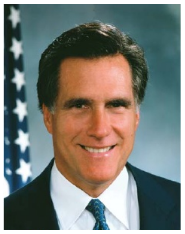For your weekend reading: Mitt Romney’s 2004 “Massachusetts Climate Protection Plan.”
Mitt Romney’s 2004 Massachusetts Climate Plan[protected-iframe id=”f181c5f3850148ef27f30bc7d9922c8e-5104299-36375464″ info=”http://www.scribd.com/embeds/104525085/content?start_page=1&view_mode=scroll&access_key=key-84yae3mj8t16ena7yj8″ width=”470″ height=”626″ frameborder=”0″ scrolling=”no”]
From the then-governor’s introduction:

Then-Massachusetts Gov. Mitt Romney, 2004.
I am proud to announce the Massachusetts Climate Protection Plan, the first in the history of the Commonwealth and among the strongest in our nation. Since taking office in January 2003, this Administration has embarked on a “no regrets” policy towards climate change. Rather than focusing our energy on the debate over the causes of global warming and the impact of human activity on climate,we have chosen to put our emphasis on actions, not discourse. If climate change is happening,the actions we take will help. If climate change is largely caused by human actions, this will really help. If we learn decades from now that climate change isn’t happening, these actions will still help our economy, our quality of life and the quality of our environment.
Emphasis added. Romney, true to form, provides lots of wiggle room in attitude on the topic. “If you believe X, cool. If you don’t, still cool.”
He continues:
For Massachusetts, promoting climate protection in the Commonwealth and throughout our nation also promotes Massachusetts businesses that are at the forefront of the new markets for renewable energy technologies. Just as the brainpower of this state has been put to work by the nation and the world to develop the high-tech and biotech industries, we can also lead the nation in new energy technologies.
Compare this argument with his rejection of the wind tax credit — and, of course, his speech at the Republican convention.
The plan itself, which we found at the Washington Post website [PDF] via Christopher Mims, goes much further in rebutting Romney’s newfound disdain for addressing the climate. This isn’t the first time people have noticed this plan, but it’s definitely worth revisiting. It repeatedly notes the potential for job creation from stemming greenhouse gases, lifting up examples of Massachusetts businesses that are putting people to work in the renewable energy industry. It identifies a number of government initiatives, including one that would “provide investment capital to Massachusetts renewable energy companies” (page 30) — precisely what was done in the much-derided case of Solyndra. It proposes increasing energy efficiency, curbing sprawl, and supporting public transit. It suggests improved fuel efficiency for automobiles, which President Obama just announced and which 2012 Romney opposes.
This document is full of sensible, smart ideas, nearly all of which were ahead of the curve in 2004, and some of which Boston is putting into place now. But nearly all of the ideas are anathema to the Republican voters who selected Romney as their party’s candidate. The good news is that Romney has supported these initiatives before. The better news is that it’s not unheard of for him to change his mind.



